Is GPT-3 The Best AI?

Table of Contents
GPT-3 is a powerful AI language model developed by OpenAI. But, is GPT-3 the best AI out there?
In the following text, we'll explore the capabilities of OpenAI’s model and compare it to other alternatives to discover if it is the most supreme.
Prime Day is finally here! Find all the biggest tech and PC deals below.
- Sapphire 11348-03-20G Pulse AMD Radeon™ RX 9070 XT Was $779 Now $739
- AMD Ryzen 7 7800X3D 8-Core, 16-Thread Desktop Processor Was $449 Now $341
- ASUS RTX™ 5060 OC Edition Graphics Card Was $379 Now $339
- LG 77-Inch Class OLED evo AI 4K C5 Series Smart TV Was $3,696 Now $2,796
- Intel® Core™ i7-14700K New Gaming Desktop Was $320.99 Now $274
- Lexar 2TB NM1090 w/HeatSink SSD PCIe Gen5x4 NVMe M.2 Was $281.97 Now $214.98
- Apple Watch Series 10 GPS + Cellular 42mm case Smartwatch Was $499.99 Now $379.99
- ASUS ROG Strix G16 (2025) 16" FHD, RTX 5060 gaming laptop Was $1,499.99 Now $1,274.99
- Apple iPad mini (A17 Pro): Apple Intelligence Was $499.99 Now $379.99
*Prices and savings subject to change. Click through to get the current prices.
Essential AI Tools
GPT-3 capabilities
Before determining whether GPT-3 is the best artificial intelligence, we need to understand what it does. GPT-3 is the next-generation machine learning model from OpenAI – the successor of GPT-2.
The AI model has the ability to understand the complexities and nuances of human language. Therefore it is able to understand text inputs and respond to users’ requests.
The model achieves this because it is trained on a vast text dataset. It was then fine-tuned for natural language processing tasks, such as text summarization, ad copy generation, and caption creation among others. Essentially, its algorithm enables the model to generate new text in a human-like style and tone.
GPT-3 is among the most powerful NLP models, with parameters reaching up to 175 billion. As a result, it can generate high-quality content that is often indistinguishable from that written by a human.
GPT-3 can be used for a wide variety of content creation applications. From generating blog posts and completing language translation to creating social media posts and product descriptions.
- NOW READ Will ChatGPT take jobs?
Its versatility and accuracy make it a powerful tool for businesses and individuals, with clear strengths in generating long-form content. At the moment, it is the powerhouse behind OpenAI’s free chatbot, ChatGPT.
Comparing GPT-3 to other AI models
While GPT-3 is undoubtedly a powerful AI model, it's not the only one out there. Other AI models are specifically for tasks like computer vision or natural language processing.
For instance, the Google AI model BERT is for natural language processing and has shown impressive results in language understanding tasks.
Meanwhile, the AlphaGo AI model developed by Google DeepMind is for playing the game of Go and has beaten some of the world's best players. So, while GPT-3 may be the best AI for generating human-like text, other AI models are better suited for specific tasks.
GPT-3 limitations
While GPT-3 is a powerful AI model, it does have some limitations. One of these limitations is its inability to understand the context.
While it can generate text similar in style and tone to human writing, it doesn't always get the context right.
For instance, if you ask GPT-3 to write a news article about a recent event, it may generate text that is accurate but doesn't reflect the full context of the event. This can lead to inaccuracies and misunderstandings.
Another limitation of GPT-3 is its reliance on data. It can generate impressive text. But it's only as good as the data that OpenAI has used for its training.
Unfortunately, GPT-3 doesn’t have access to live information from the internet. So, in some instances, its responses can be outdated.
So, is GPT-3 the best AI?
So, is GPT-3 the best AI out there? The answer is that it depends on what you're looking for. GPT-3 is undoubtedly one of the best options available. This is especially true if you need an AI model to generate human-like text. And you need to use it for a wide variety of applications.
In recent news, OpenAI has released the next generation GPT model: GPT-4. This large language model (LLM) also has image-to-text capabilities, making it much more advanced than its predecessor.
Ultimately, the best AI model for a given task depends on various factors. These include the specific task, the quality of the data, and the intended application.
AI technology continues to evolve and improve. Therefore, we expect to see even more powerful and specialized AI models.
Conclusion
GPT-3 is a powerful AI model that has revolutionized natural language processing. Its ability to generate human-like text has made it a valuable tool for a wide range of applications.
However, it's important to remember that OpenAI GPT-3 is imperfect and has limitations. So, is GPT-3 the best AI? It's difficult to say definitively, as the answer depends on the specific task and application.
If you’re interested in testing out GPT-3’s capabilities, you can play around with various variations of the model on the OpenAI API.
Looking for an easier way to test the model? Then head over to ChatGPT instead. Want more AI information? Be sure to check out our GPT-3 vs GPT-4 guide next.

